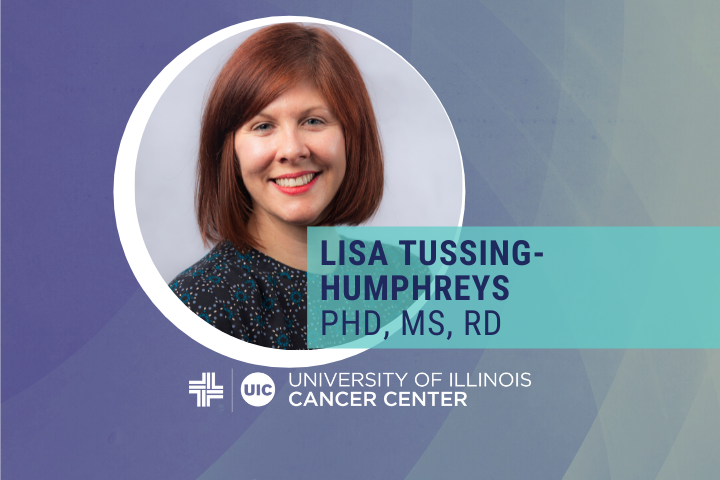
University of Illinois Cancer Center program leader Lisa Tussing-Humphreys and UIC College of Applied Health Sciences Professor Krista Varady received a $3 million NCI grant to investigate the effects of time-restricted eating versus daily continuous calorie restriction on body weight and colorectal cancer risk markers among adults with obesity.
The research builds on Varady’s studies demonstrating the safety and preliminary efficacy of time-restricted eating (a form of intermittent fasting) on weight, adiposity, and metabolic health, and Tussing-Humphreys’ research on diet, energy balance and colorectal cancer prevention. Obesity increases a person’s risk of developing colorectal cancer by about 30%.
The high-impact clinical trial was funded through NCI’s Provocative Questions request for applications that solicited proposals to examine how intermittent fasting affects cancer incidence, treatment response, or outcomes in humans.
“In animal studies, time-restricted eating imparts cancer-protective effects, including lower body weight, decreased systemic inflammation and improved glucose metabolism,” said Tussing-Humphreys, PhD, RD, leader of the Cancer Center’s Cancer Prevention and Control program.
Time-restricted eating shows promise for reducing body weight and colorectal cancer risk among individuals with obesity because of its simplicity, she explained. It focuses on limiting the number of hours in which calories are consumed. Participants can eat what they want, with no calorie counting, as long as their eating is limited to the prescribed eating window.
Traditional calorie restriction for weight loss to treat obesity has had limited success due to low adherence to tedious daily calorie monitoring, Tussing-Humphreys added.
The new trial will enroll and randomize 255 obese adults with a history of colorectal adenoma to traditional caloric restriction for weight loss, an eight-hour time-restricted eating regimen from 11 a.m. to 7 p.m., or the control group of unrestricted eaters.
The trial’s first six-month phase will involve active weight loss for the participants, with the second phase assessing weight maintenance.
Participants will provide tissue, stool, and blood samples throughout the trial for clinical assessment. Co-investigators for Tussing-Humphreys’s trial include Cancer Center members Marian Fitzgibbon, PhD; Nelson Chen, PhD; Cemal Yazici, MD; and Peter Gann, MD.
